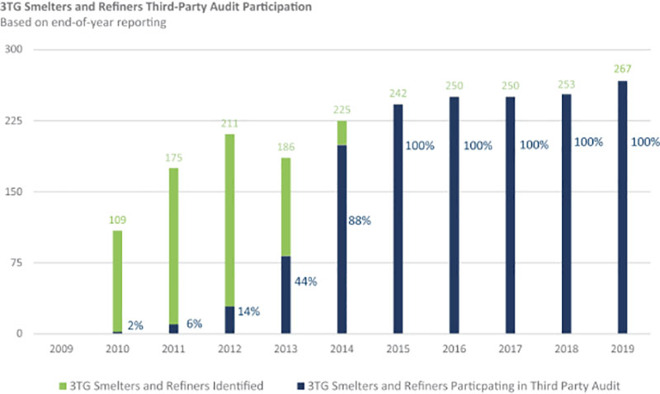Apple removed 18 smelters and refiners in 2019 for flouting conflict mineral code of condu...
Apple in a report on mineral sourcing issued Thursday said 18 smelters and refiners that were not willing to participate in third-party audits were removed from its supply chain in 2019, resulting in a 100% audit participation rate for the fifth consecutive year.

Source: Apple
In a disclosure to the U.S. Securities and Exchange Commission, Apple detailed efforts to responsibly source so-called conflict minerals -- tin, tantalum, tungsten, gold (3TG, collectively) and other minerals -- used in the production of iPhone, iPad, Mac, iPod touch, Apple TV, Apple Watch, AirPods, HomePod, Apple Card, Beats products and all Apple branded accessories.
Apple, like other U.S. corporations, are beholden to sourcing legislation designed to cut conflict minerals out of the supply chain. As defined by law, conflict minerals include 3TG and other common minerals used to finance conflict in areas like the Democratic Republic of Congo.
At the end of 2019, Apple found none of its recognized 267 smelters and refiners to have sourced 3TG that directly or indirectly funded armed groups in the DRC or adjoining countries. Of those 267 entities, 24 were known to be sourcing from the DRC or a nearby country.
The year started with 323 smelters and refiners, though 36 were removed due to erroneous or unintentional reporting by suppliers. Apple requested the removal of 18 smelters and refiners for failing to meet predefined standards including participation in third-party audits, acting on corrective action plans or meeting Apple's supplier code and requirements. Another two were found to be out of business.
Members of Apple's supply chain must follow the company's Supplier Code of Conduct and Supplier Responsibility Standard on the Responsible Sourcing of Materials, which requires suppliers to "engage with smelters and refiners to assess and identify a broad range of risks beyond conflict, including social, environmental, and human rights risks." Along with standard OECD Due Diligence Guidance, Apple fields a supplier responsibility team, integrates additional safeguards in its code of conduct and regularly engages with suppliers. The company also supports and assists in the development of industry standards on responsible sourcing and fosters on-the-ground reporting through various independent programs.
Apple's efforts to minimize conflict minerals is one facet of a larger responsible material sourcing initiative. The tech giant has long touted its various environmental projects and in 2017 set a goal of one day relying solely on recycled and renewable minerals and materials across its product line. 3TG are among the 14 materials prioritized in the project, Apple said.

Source: Apple
In a disclosure to the U.S. Securities and Exchange Commission, Apple detailed efforts to responsibly source so-called conflict minerals -- tin, tantalum, tungsten, gold (3TG, collectively) and other minerals -- used in the production of iPhone, iPad, Mac, iPod touch, Apple TV, Apple Watch, AirPods, HomePod, Apple Card, Beats products and all Apple branded accessories.
Apple, like other U.S. corporations, are beholden to sourcing legislation designed to cut conflict minerals out of the supply chain. As defined by law, conflict minerals include 3TG and other common minerals used to finance conflict in areas like the Democratic Republic of Congo.
At the end of 2019, Apple found none of its recognized 267 smelters and refiners to have sourced 3TG that directly or indirectly funded armed groups in the DRC or adjoining countries. Of those 267 entities, 24 were known to be sourcing from the DRC or a nearby country.
The year started with 323 smelters and refiners, though 36 were removed due to erroneous or unintentional reporting by suppliers. Apple requested the removal of 18 smelters and refiners for failing to meet predefined standards including participation in third-party audits, acting on corrective action plans or meeting Apple's supplier code and requirements. Another two were found to be out of business.
Members of Apple's supply chain must follow the company's Supplier Code of Conduct and Supplier Responsibility Standard on the Responsible Sourcing of Materials, which requires suppliers to "engage with smelters and refiners to assess and identify a broad range of risks beyond conflict, including social, environmental, and human rights risks." Along with standard OECD Due Diligence Guidance, Apple fields a supplier responsibility team, integrates additional safeguards in its code of conduct and regularly engages with suppliers. The company also supports and assists in the development of industry standards on responsible sourcing and fosters on-the-ground reporting through various independent programs.
Apple's efforts to minimize conflict minerals is one facet of a larger responsible material sourcing initiative. The tech giant has long touted its various environmental projects and in 2017 set a goal of one day relying solely on recycled and renewable minerals and materials across its product line. 3TG are among the 14 materials prioritized in the project, Apple said.

Comments
That version also clearly lists Cobalt on the 100% audited list.
https://www.apple.com/ca/supplier-responsibility/pdf/Apple_SR_2019_Progress_Report.pdf